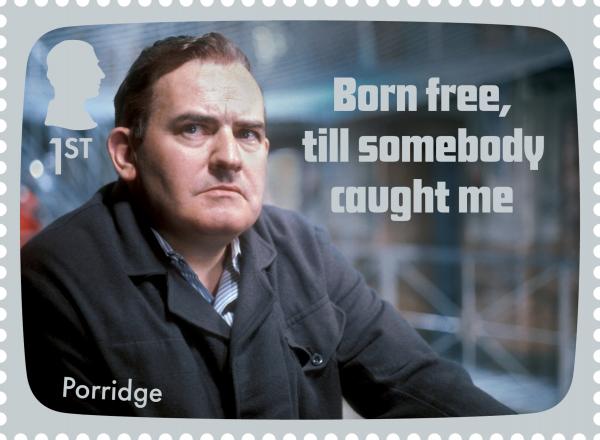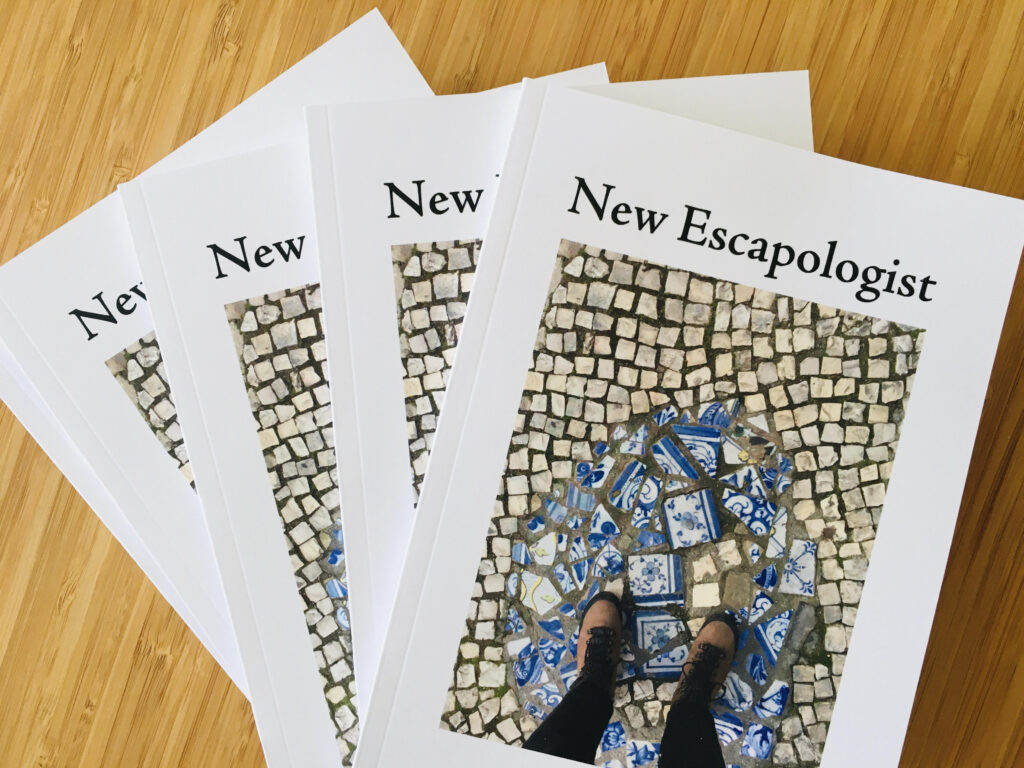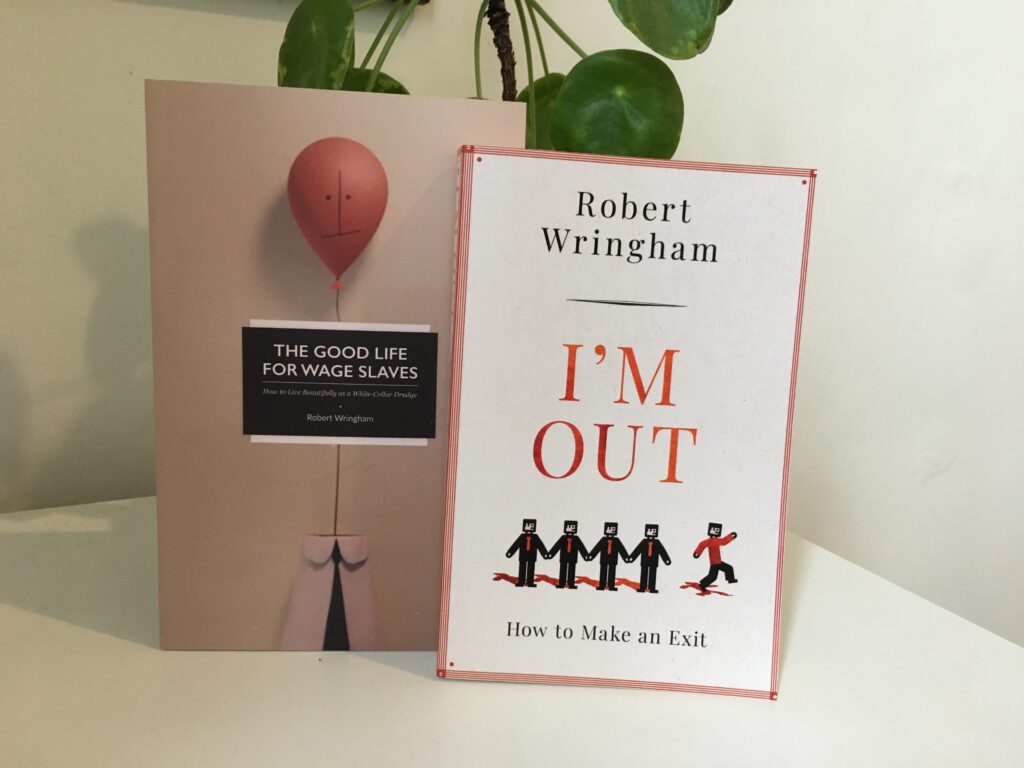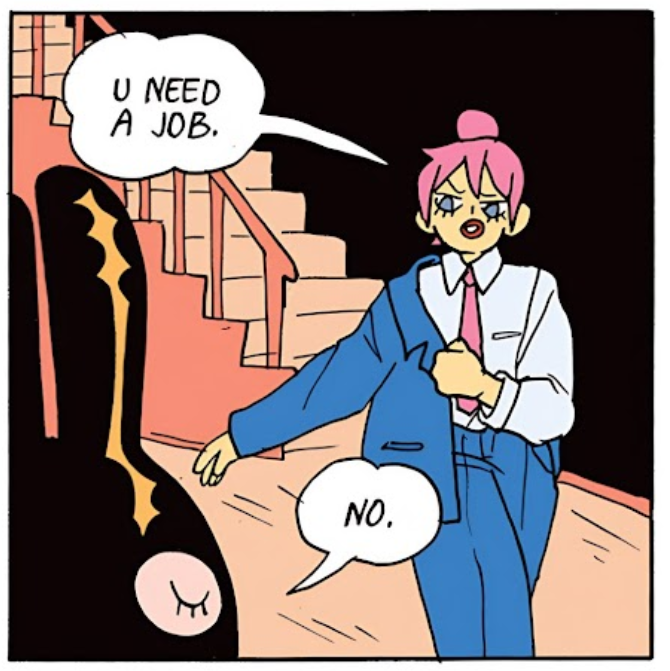The Suck-Suck Man
I’ve enjoyed Mr. Biffo’s comedy for years. Sometimes it takes the form of unhinged Tim and Eric-style sketches. Other times, it’s grounded in video game reviews and a teletext aesthetic. He’s funny!
Lately, he’s turned his attention to social issues, reporting on them with good humour but relatively straight. This video explains UBI in a very funny and accessible way.
*
New Escapologist Issue 16 is available now. Support a tiny cultural production – get a copy toady!
Fletch
Thanks must go to the New Escapologist correspondent (okay, it was Henry) who sent me a letter, received this morning with this stamp on the envelope. Truly first class.

*
New Escapologist Issue 16 is still available, while stocks last, at our online shop.
Shifting Units

Thanks to everyone who bought a book in our recent half-price sale. All orders have shipped and will be with you very soon. My storage woes are over, but you know something? It felt great to shift some units. So let’s do it again, albeit in a slightly lesser fashion.
The Good Life For Wage Slaves is half price again. Use GOOD50 at checkout.
I’m Out can’t be half price any more (I’m starting to run low), but you can have £2 off. Use OUT2 at checkout.
And I’ll kick myself for doing this, but you can also have £1 off Issue 16. Use QUID16 at checkout.
All of these coupons apply to digital editions as well. I want to be fair to the cyborgs among you.
The offer runs for one week. And then that’s it! Go forth. And thanks again.

What Do We Want? More Time for Golf! When Do We Want it? After My 12:30 With Steve!
This is from Maclean’s:
The big question is: what will we do with all that extra time? Some will use it on family-oriented activities, like caring for elderly relatives or spending more quality time with their kids (not to mention saving on childcare costs). Others might return to a lapsed hobby or develop a skill they never thought they’d get a chance to learn. For example, foreseeing a huge increase in leisure time, Steven Cohen, an American venture capitalist and the owner of the New York Mets, has reportedly invested heavily in golf. The ultimate goal is working to live—not the other way around.
The reduction of working hours is a classic demand of labour movements, so it’s good (as with UBI sometimes) to see the four-day week being discussed favourably by the conservative press. It shows that the Overton window is shifting in favour of less work and more leisure.
*
The latest edition of New Escapologist is available from our online shop.
City Slicker
From the blog of lifestyle guy George Hahn:
Between the space I occupy, the goods I consume, the energy I burn, and the trash I generate, I would argue that I create a comparatively small footprint for an American.
As everybody who knows me knows, I love city living. Aside from its unparalleled cultural offerings, amazing restaurant options and unyielding excitement, it’s incredibly efficient.
This is something I think about a fair bit. I watch all these Tiny Home videos (and I enjoy them!) but bristle slightly when they boast about their green credentials. How can building a house from scratch in the middle of nowhere be greener than living in an apartment building, close to everything you need, that already exists?
I love Tiny Homes and I see the economic attraction to them, especially if you’re coming from a city like, say, Melbourne where the cost of living is out of control. But buying land and putting a home on it — even a tiny one — is a contribution to urban sprawl. And, when all is said and done, building a new thing (any new thing) involves the extraction of raw materials from the earth. Many (but not all) of these Tiny Homes won’t last for decades or centuries like a real house. Not a problem for you if you don’t care about asset depreciation, but a disposable house is hardly the green option even if you invest in solar panels and keep your own chickens.
Around and around go my green bean-counting thoughts and I always come back to the conclusion that the greenest (as well as happiest, most cost effective, most socially-responsible) option is to live in a city. In a small apartment. As well as helping to continue the life of an old thing (with all its character and charm) instead of building new, you have all the efficiencies of high-density living. Everything you could possibly need is within walking distance so you might not need a pollution-producing car. Recycling centres are abundant. Club goods like gyms and libraries mean you don’t need to own so much stuff. It’s green! It’s efficient! Really!
After nearly 30 years as a New Yorker, I think I’ve managed to crystalize the biggest bonus of city living into one word, which is basically a byproduct of the city’s efficiency: access.
He means access to culture, supplies, transit, other people. And I think he’s right. I could be wrong because I don’t live in the country and there might be factors I’m not seeing, but I think he’s right.
On the other hand, Hahn seems to like “big cities” best of all and, while acknowledging their expense, he advocates for London, NY, Tokyo.
Instead, I’d say it’s smarter to keep it simple and live in a cheaper city if you want to work less and have a better chance at escaping the consumer treadmill: Glasgow, Manchester, Liverpool, Montreal, Naples, Antwerp, [East] Berlin. Why not? Escapology happens more readily in the margins.
A Wake-Up Call
Thanks to everyone who emailed to tell me about Denise Prudhomme, who died while working for a huge corporation.
What Prudhomme’s death at her desk triggered is a stark reminder that life is short, and raises the bigger question of whether we are wasting precious time working for large companies who, at the end of the day, don’t notice if an employee dies at their desk for four days. In a year filled with headlines of tech layoffs where huge corporations continue to put profit over people and corporate America wrestles with return-to-office mandates that employees are outright rejecting, Prudhomme’s death might be the event that pushes many to leave the rat race.
The linked article (from Forbes no less – Forbes!) slams big companies for working their employees literally to death, then tells of new trends in people waking up to life being short and escaping The Trap while they can. A third of British women, for example, plan to quit work before retirement, in part because of work’s insensitivity to the menopause but also due to a growing “collective rejection of the notion that only one kind of career path and one kind of job offers stability.”
Which, of course, is wonderful news. The media talk about the Great Resignation but maybe it should be called the Great Awakening as more and more people wake up from the spell and come to their senses.
[Prudhomme’s] experience highlights a stark truth: that we really are just a number to the place where we spend the majority of our waking hours. The harsh reality is that we are spending our time and energy in the wrong place for the wrong people. For many, Prudhomme’s death is a wake-up call to make changes while they still can. And that’s a special legacy to leave.
That’s Just What We’re Going To Do
I noticed today that the ‘about’ text at our Substack is old. I wrote it almost two years ago when I was re-launching the magazine.
I’m going to update it shortly but let’s have a quick look at that expired old text to archive and reflect upon it.
New Escapologist was a small press magazine for over a decade, beginning with a pilot issue in 2007 and ending with a chunky final edition in 2017. Since then, I’ve kept the spirit alive with a blog (digested monthly in this newsletter), a column in the Idler, and two books.
Hah. “Final edition.” Whenever New Escapologist was spoken about in the past tense (between 2017 and 2023), it gave me a pang of mild sadness. That alone wasn’t enough to bring it back, but I’m glad it’s back.
The theme of this franchise has been escape, typically from the alienating concerns of work and consumerism, with a sense of style and grace and humour.
I’d like to cover more kinds of escape than the escapes from work and consumer culture. I already know that Issue 17 will see some examples of that.
Over the years, New Escapologist saw contributions from Alain de Botton, Caitlin Doughty, Mr Money Mustache, Will Self, and Tinky Actual Winky from Teletubbies. Most importantly, we published over 200 essays designed to temper the work ethic.
And with two interviews per issue now plus a roster of columnists, we’re attracting more prominent citizens than ever before. Famous names is no reason to buy the magazine. But the thoughtful things these cherrypicked favourites happen to say is a good reason to buy the magazine.
In 2023, it’s clearer than ever that “honest hard work” is not the answer to poverty, loneliness, boredom or ill health.
And in 2024 it’s clearer still. Recent news stories include a “presenteeism epidemic,” people being unable to afford sick leave, graduates who’d be better off if they hadn’t gone to university, and a cleaner sacked for eating a sandwich.
Moreover, people are questioning the primacy of centralised digital platforms.
Also in recent news is the analysis of how social media enabled far-right riots across the UK.
The time is ripe to bring the mag back! So that’s just what we’re going to do.
We’ll do it again too.
*
We use Substack to distribute a free email newsletter to 1,500 people. Join us! Expect a digest of this very blog plus an original top and tail. Plus the occasional special offer.
A Swiss Picnic
This is an interview I gave to a Swiss newspaper when Das Gute Leben (the German-language version of The Good Life for Wage Slaves) came out in 2020. They wanted to talk about what the Swiss call “home office” (i.e. working from home) in the then-pressing context of the pandemic. I don’t know how much of this made it into the newspaper, but I recently chanced upon the full transcript.
Many studies and surveys (before Corona) come to the conclusion, that working from home is not as great as people think. Why do you think that is?
The most cited disadvantage to home office is that there are too many distractions at home and not enough motivation to work. But when you stop to think about it, there are far more distractions at the office. At home, you need some self-control to switch the TV off and you need to resist the temptation to play PlayStation, but the fact remains that you can turn those things off. At the office, you can’t turn off other people’s noisy gadgets or the antics of an office joker or an overbearing manager.
It’s just a question of learning to deploy self-control for your own benefit instead of someone else’s. If you’ve got the self-control to set an alarm clock for 6am and to trudge to the train station and reach the office on time, you clearly have enough power within yourself to to work independently. And even if you occasionally do give in to the temptation to watch Netflix when you should be working, at least you’re slacking off in a fun way! Research shows that people spend vast swathes of time in the office pretending to work anyway. It’s called “presenteeism” and it’s a far darker and more depressing situation than trying to resist a 2pm nap, which actually might improve your life and your productivity anyway.
I understand it’s tricky for people with children to work at home under lockdown, but under normal circumstances, the children will be at school or in day care. The lockdown home office situation is a bit more tense than regular home office.
Read the rest of this entry »
How Working a 9-5 Ruins Your Life and How Consumerism Leaves You Broke and Sad by Design
The idea of a grown-ass adult having to request time off is hilariously sad to me.
Reader M draws our attention to a YouTuber called Nicole. M writes:
I’ve been enjoying her no-BS style. She dispenses tips and wisdom on personal finance, frugal living and all the rest. None of it is new, but she’s unusually young to have already worked out The Trap and is telling the world about it on YouTube.
M’s right. She’s fab.
*
New Escapologist Issue 16 is available now.
And there’s a half-price sale on Robert Wringham’s Escapology books this week only.




